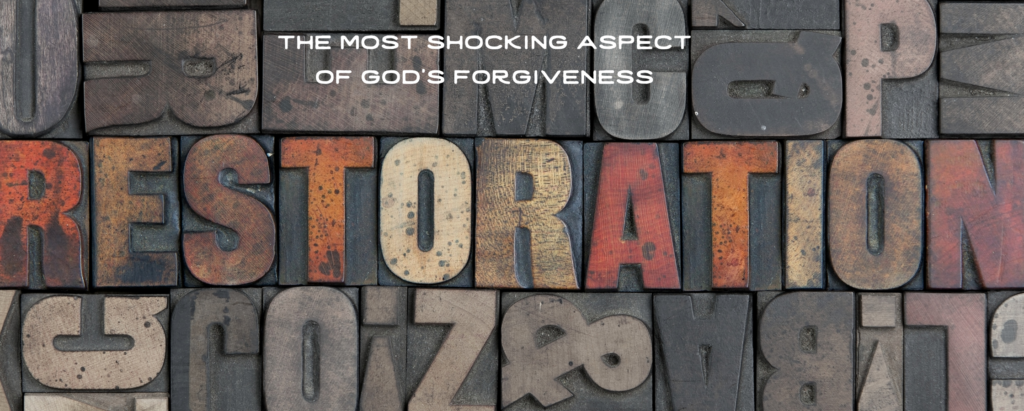In just two days, my new book Forgiving Challenge and its companion written by my wife Forgiving Challenge Kids will officially be released. The book is organized through an acronym SCARS (Sin, Confession, Absolution, Restoration, Sanctification) that helps us on our journey to freedom. In anticipation of this launch, we’ll drop a blog each day around each of these concepts.
Today’s blog helps us understand how God’s absolution and restoration work in our lives.
Pretty much anyone agrees that forgiveness is healthy in our lives. But what does it mean to truly be forgiven? To forgive others? How does God forgive us?
What does it truly mean to be forgiven?
The definition of forgiveness is twofold:
- To Cancel a Debt
- To Stop Feeling Anger or Hatred Toward Someone for an Offense, Flaw, or Mistake
When we receive the total forgiveness of God, our debt is cancelled, and the Lord’s righteous anger is gone. God’s forgiveness is not either/or. It is both/and.
Let’s look at both aspects, starting with the first—canceling a debt.
Absolution
Human beings love justice and law stories. Just look at how many CSI, NCIS, and Law and Order shows there have been. It doesn’t take too much creativity to add one of these shows to network television. Slap a new city on it (LA, New Orleans, Miami), and you’ve got viewers ready to eat popcorn and binge. If Netflix is your jam, look at the “Top 10 Trending,” and you’re likely to find at least a couple of trial or crime documentaries. Why? Because we are ruled by law and justice in this world.
In God’s economy, according to Romans 3:10 and Romans 3:23, we are sinful; therefore, we are all guilty. Every one of us. And yet, directly after this verse that declares our guilt, we read this passage from Romans 3:24:
“…and all are justified freely by his grace through the redemption that came by Christ Jesus.” Romans 3:24
Justification is to be made right before God. If sin separates us from being in a right relationship with God, His justification, offered to us in a gift of grace, brings us back into right relationship with Him.
But how is this possible? Because, again, we’re not righteous. If God is truly all-knowing (omniscient), and He is everywhere at once (omnipresent), then how can we be righteous? Did we somehow get into His blind spot? Is God just busy with other stuff going on in the world that as long as He sees us in church every now and then, we’re okay? No, it’s bigger than this.
To explain, let me share a metaphor that I heard in one of Pastor Matt Chandler’s sermons. He tells us to picture a courtroom, where you and I are the defendants. We know that we are, in fact, guilty. When it is our time to speak, we even stand up and declare our guilt. And yet somehow, when it’s decision time, the judge bangs the gavel down and declares us innocent. All charges dropped.
Absolution is the declaration that you have been forgiven. You have been formally released from any guilt, obligation, or punishment. It is the announcement that your sins have been paid for. The debt has been cancelled.
In this world, we face a choice. We can receive that declaration of innocence or reject it and receive punishment for our sins. Even worse, we can reject the offer of forgiveness and then try to work our way out of the punishment.
The apostle Paul warns us against this foolishness in Galatians 2:16a: We “know that a person is not justified by works of the law but through faith in Jesus Christ.”
We are not justified by works of the law, which means at our best we’re still lawbreakers. We will not be made right, we will not be declared innocent, simply by behaving in a way that’s acceptable before God. The good news is that the banging of the gavel and the declaration of our innocence and forgiveness, is not based on whether or not we have been obedient to the law, but by faith in Jesus Christ.
You will not be able to save yourself. You will not be good enough. You will never perfectly fulfill the requirements of the Law. You can’t be perfect.
But there is a person who lived a perfect life. He lived a life full of good works and full adherence to the Law. His name is Jesus. Because Jesus was perfect, He was the only one capable of bringing forgiveness of sins to all people. Jesus came into this world on a mission to save sinners by bringing forgiveness to all of those who call on His name.
Without God’s forgiveness in our lives, we would never experience freedom in this world. It’s impossible. Some people may behave like they are free and look like they are free, but it’s a lie. You cannot be free without God declaring you innocent. Jesus came to set all of the oppressed free. He, and He alone, had this special call on His life. And He knew it.
The apostle Paul tells us this so clearly: “The saying is trustworthy and deserving of full acceptance, that Christ Jesus came into the world to save sinners.” 1 Timothy 1:15a (ESV)
Sin is costly. There are consequences to our bad actions, thoughts, and deeds. And God is not going to let sin go unpunished.
In the Bible, God the Father is often referred to as a judge. We also encounter “judges” all the time in the form of friends, coworkers, and acquaintances who evaluate our actions. But the only judge who matters knows everything about your story. To solve the “sin problem,” His answer was to send His Son Jesus into the world on a rescue mission. Amazingly, Jesus took all of the consequences of our sin upon Himself. A sinless man carried the weight of all of your sin, all of my sin, all of humanity’s sin—past, present, and future—with Him when He willingly, sacrificially, gave His entire life for us on the cross.
Jesus suffered a brutal death for you. In fact, at the time they didn’t have a word to describe the horror and brutality of those who were tortured on a cross, so they came up with a new word: “excruciating.” In Latin, this means “out of the cross.” Jesus was whipped, beaten, and suffered greatly. Not only this, but He was betrayed by His closest friends. As He was hanging on the cross, struggling to breathe, nearing the end, the Gospel of John says the very last phrase Jesus uttered was one Greek word—tetelestai. In English, it is translated: “It is finished.”
After this, Jesus bowed His head and gave up His Spirit. Interestingly, “the word tetelestai was also written on business documents or receipts in New Testament times to indicate that a bill had been paid in full.”
Tetelestai = Paid in Full
The devil thought that Jesus was finished. But the only thing that was finished was the payment for our sins.
We owed a debt we could never pay. Jesus paid a debt He did not owe!
The same Spirit that Jesus gave up on Friday would bring resurrection power on Sunday. The resurrection is the objective evidence that the bill has been paid in full.
It has been well said that Christ’s resurrection is the Father’s “Amen” to His Son’s declaration, “It is finished.” His empty tomb and His resurrection are indisputable testimony that the Father accepted His Son’s payment for sin on our behalf.
When Greek readers saw the word tetelestai, they would know that what Christ accomplished at the cross was the full payment of all of mankind’s sins.
Including yours.
Your sins are no more special than mine. Your sins are not in a different category than mine. Your sins are no greater than mine. And like mine, your sins have been paid in full by the blood of Jesus.
Will you reject this or will you receive this?
You are forgiven in the name of the Father, by the blood of Jesus Christ, and through the power of the Holy Spirit. You are forgiven.
Restoration
But, it’s the second piece of forgiveness that is even more shocking to me than the first.
As great as it is to be freed from the consequences of our sin through the absolution of God, God’s forgiveness extends further than that. Many don’t get to experience complete freedom because they stop at absolution. They know that they have been freed from the punishment of their sins and that they are good eternally with God, but many refuse to enter into the next Freedom Phase of Restoration.
While I was in seminary, I once preached a sermon highlighting freedom. Some of the most daunting, scary sermons I’ve ever preached were at seminary in front of classmates and professors. After this class was over, the professor graded my sermon. He said, “Zach, you really explained freedom from sin well, but as a listener of your message, there’s also freedom ‘to something.’ You failed to bring that out. B-minus.”
B-minus isn’t the worst grade I got at seminary. But I don’t want you to come away with a B-minus when it comes to understanding the freedom God is offering you. So, let me take another crack at my professor’s advice.
Absolution is “freedom from,” but restoration is “freedom to.”
The freedom that God gives you is not only freedom from sin, but freedom to a life of purpose. God’s freedom is greater than simply a pardon and release from punishment. He also wants to release you to be a world-changer working alongside Him.
If we go back to Matt Chandler’s analogy of the courtroom, when the judge declares us innocent, even though we are not, I think all of us breathe a little bit easier. To be declared innocent after our laundry list of sins is shocking. We don’t deserve it.
At the same time that this declaration of innocence is happening, we are also fully restored. The moment you are absolved, you are also restored. It’s not that you get absolved, and then after a few years of “proving yourself” you are restored into the person God has called you to be. Absolution and restoration happen at the same time.
However, the understanding of restoration seems to happen more slowly for some people. It’s hard to wrap our minds around. If I put my own cards on the table, I don’t tend to wrestle with the idea of God paying for my sins. I can see the cross. I know the cross is an aspect of my sin and rebellion. And I know that the sacrifice of Jesus paid for my sins.
Where I struggle is believing that I can still be the person that God has called me to be. I struggle to think that God really enjoys me and could use someone like me because I’ve woefully failed Him in the past. It’s hard not to picture Him angry with me after how good He has been to me, and yet I’m still struggling with the same sin that I’ve told Him over and over I’ll never do again.
Restoration hits at identity, and identity is something the enemy loves to attack.
Absolution takes away the guilt. Restoration takes away the shame.
Just as God has fully absolved you, you need to also see that He has fully restored you.
Pastor Timothy Keller writes, “Jesus’ salvation is not only like receiving a pardon and release from death row and prison. Then we’d be free, but on our own, left to make our own way in the world, thrown back on our own efforts if we’re to make anything of ourselves. But in the Gospel, we discover that Jesus has taken us off death row and then has hung around our neck the Congressional Medal of Honor. We are received and welcomed as heroes, as if we had accomplished extraordinary deeds.”
Your past doesn’t keep God from using your life in a powerful way. In fact, until you walk in the full restoration that God makes available to you, I don’t believe you will fully experience the freedom that God has for you.
You don’t just have a just judge, but you have a loving Father as well.
God delights in you like a good father would delight in his son or daughter.
I remember when each of my two sons began to walk. They took two steps, fell down, and we freaked out like they had just won the Olympics! We took videos and sent them to our close friends and family, and then posted them on social media with the hashtag #NextUsainBolt. In the videos, my sons took a few steps, but they also fell flat on their butts. No one who watched the video, including myself, saw my kids take a few steps and thought they were clumsy clowns for falling. We were celebrating the fact that they were walking, however unsteadily.
That’s a picture of how God sees you. He cheers you on. He encourages your pursuit. He wants you to hear loud and clearly today that two steps forward and one step backward is still a step forward. So keep stepping. You are moving in the right direction.
Having a loving Father in heaven, who is not only a just judge, changes everything. No offense to any judges out there, but hanging out with a judge just doesn’t sound much fun. Judges seem like they would constantly be quoting rules and laws. But hanging out with dad? That sounds fun. I can play golf with my dad. I can watch a ball game with my dad. I can learn from my dad.
God the judge declares you innocent and fully restored into right relationship with Him. Then He bangs the gavel, takes the robes off, and starts hanging out with you.
Your past sins are cast aside, and you are restored into making a difference in this world. This relationship not only means that you are God’s son or daughter, but also that you become a co-worker with Him in this world. You get to work for Him and with Him on an eternal mission.
And it’s when you step into the calling He’s restored to you, the process of sanctification, (read a prior blog that takes a deeper look at sanctification) that you truly experience the freedom that comes from God’s forgiveness in your life.
If absolution declares “I forgive you,” restoration screams, “I love you.
If you believe this go ahead and type in the comments below “God loves ____.” In the blank insert your name.



